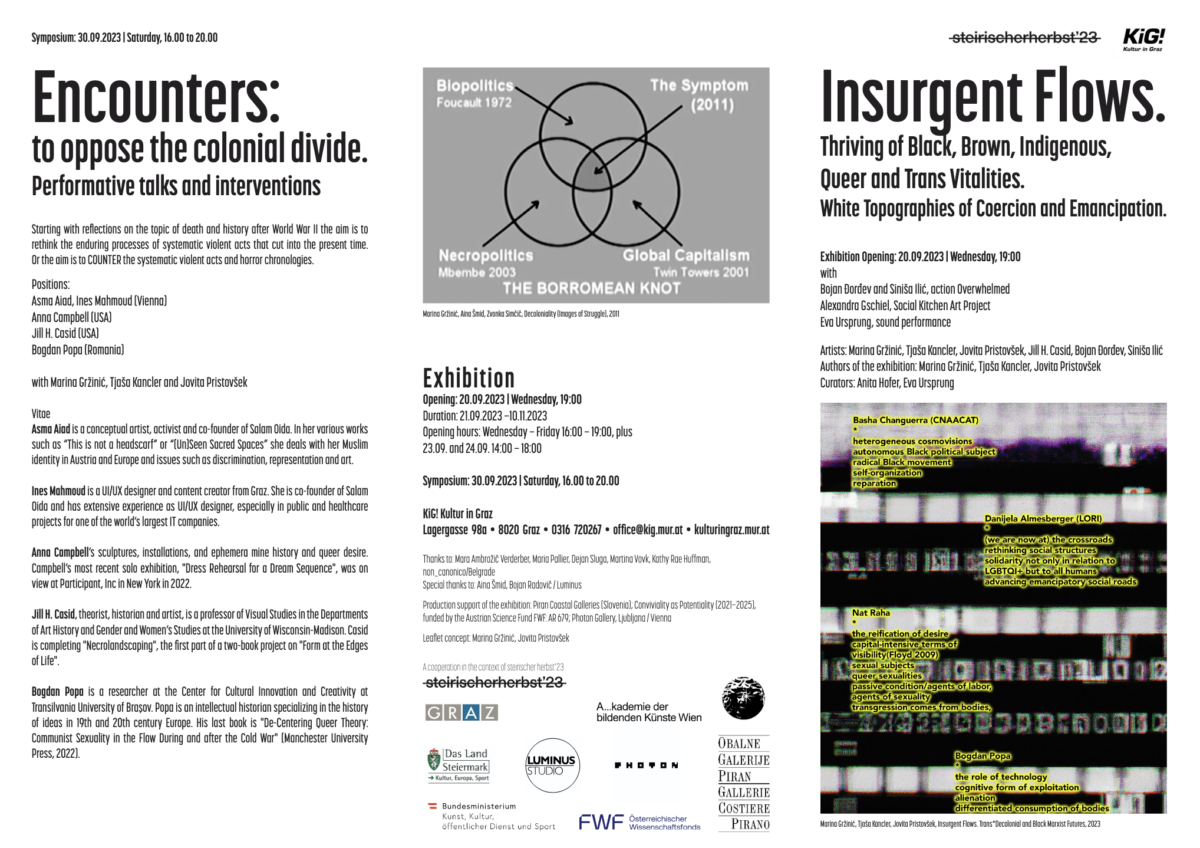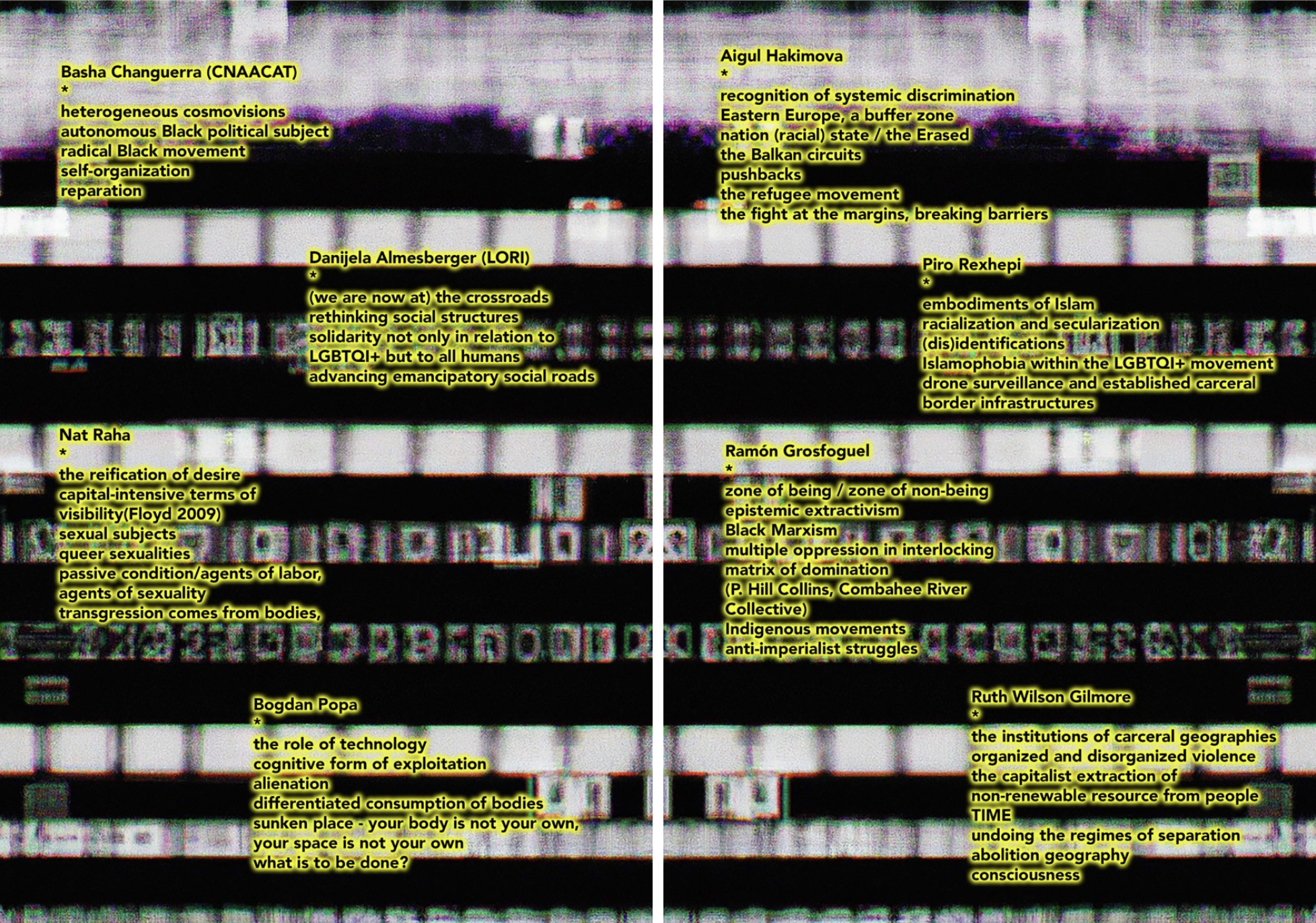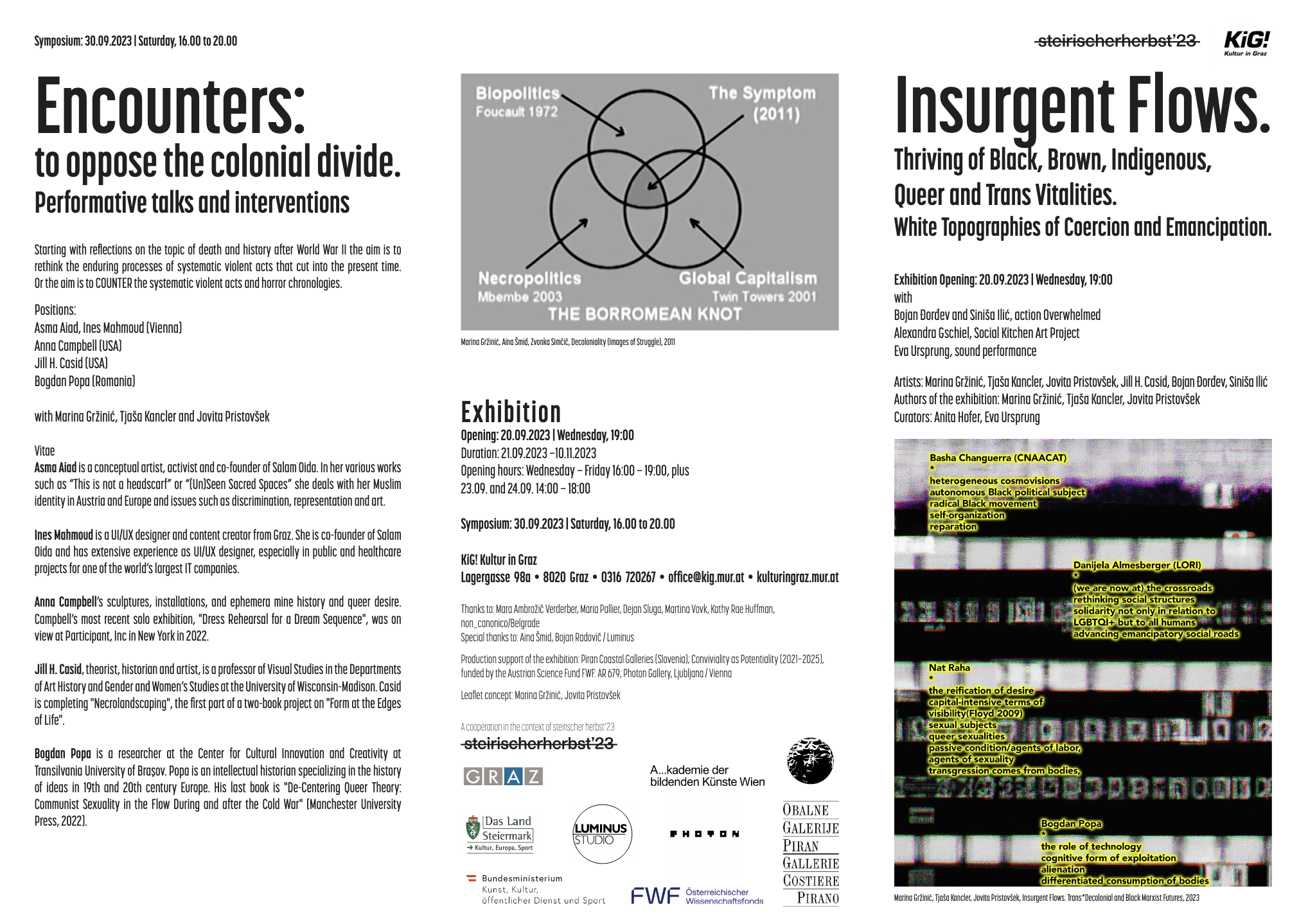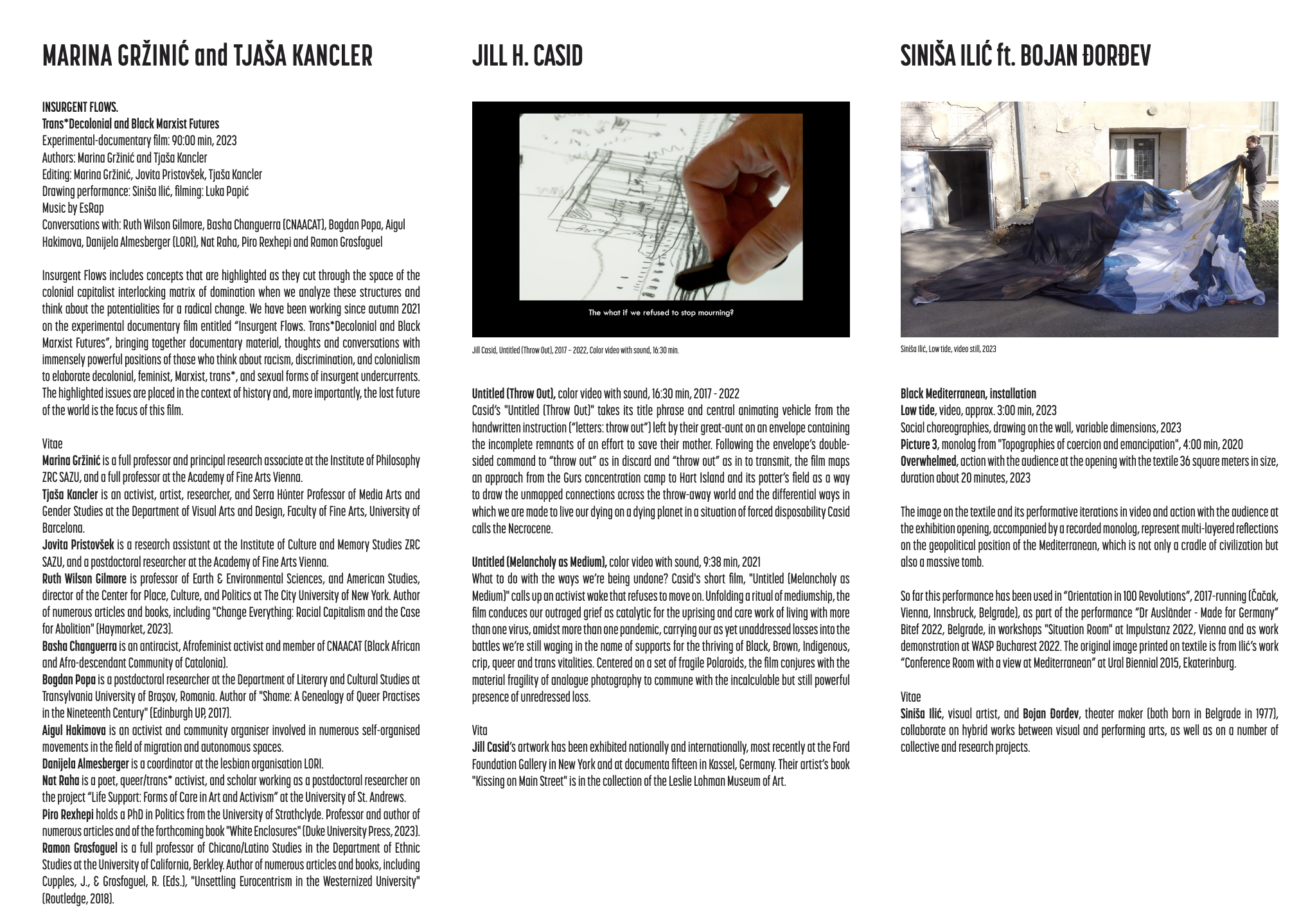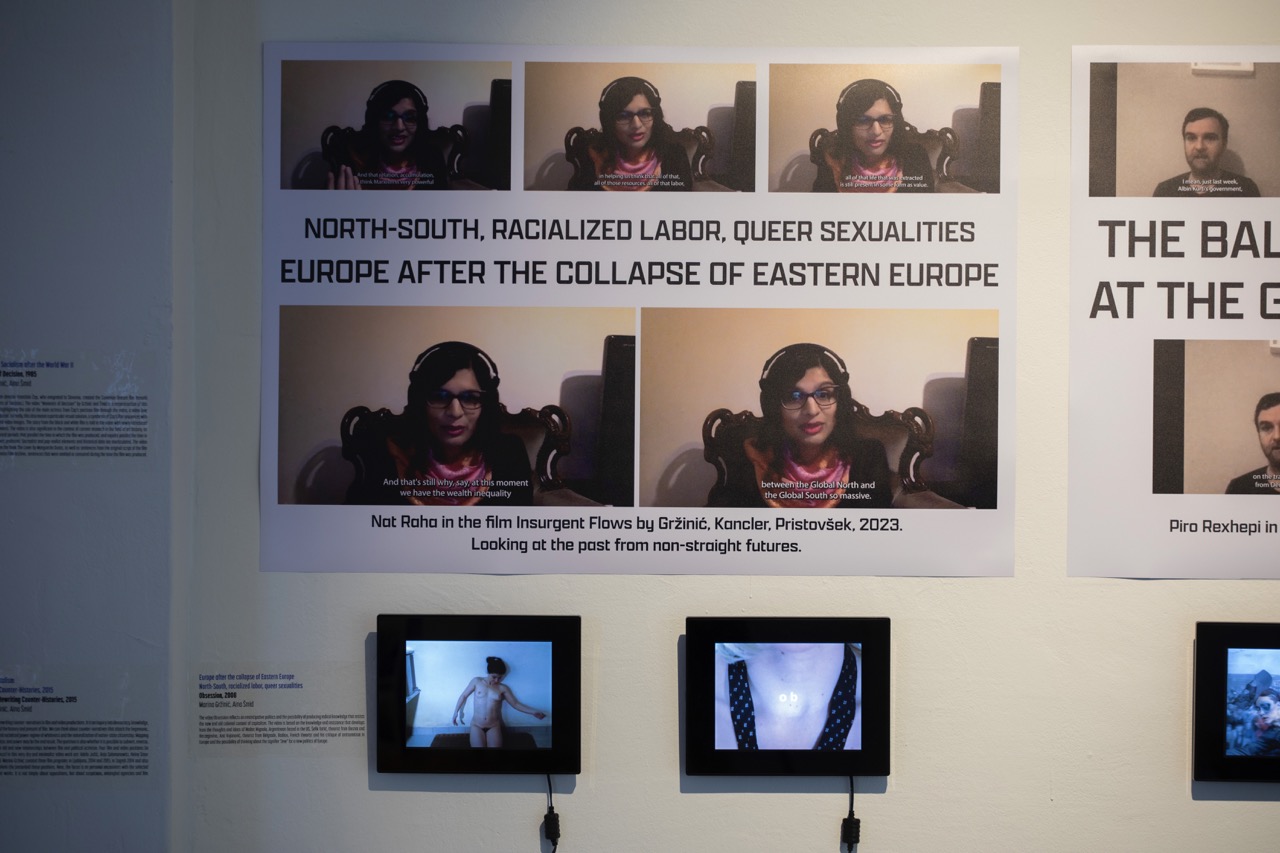 KiG! Kultur in Graz | 21.09.2023 –10.11.2023
KiG! Kultur in Graz | 21.09.2023 –10.11.2023
Artists: Marina Gržinić, Tjaša Kancler, Jovita Pristovšek, Jill H. Casid, Bojan Đorđev, Siniša Ilić
Authors of the exhibition: Marina Gržinić, Tjaša Kancler, Jovita Pristovšek
Curators: Anita Hofer, Eva Ursprung
Location: Lagergasse 98a • 8020 Graz • 0316 720267 • office@kig.mur.at • kulturingraz.mur.at
Opening hours: Wednesday – Friday 16:00 – 19:00, plus 23.09. and 24.09., 14:00 – 18:00
The mixed-media installation Insurgent Flows. reflects on death and history after World War II. The wars of the present and recent past have entirely changed geopolitical relations. The capitalist imperial powers of the United States and its NATO allies, along with various regional powers, have destroyed Africa (Libya), the Middle East (Iraq), and Afghanistan with colonial appetites. Social and political space is disintegrating under the pressure of global capitalism. The recent “crises” fuel the perpetuation of the history of racism, antisemitism, Islamophobia, sexism, and homo- and transphobia. They lead to a situation characterized by cruel erasure, displacement, discrimination, humiliation, and the denial of the rights of racialized people, migrant people, refugees, LGBTQI+ people, sex workers, and many others.
The project-exhibition and symposium Insurgent Flows. Thriving of Black, Brown, Indigenous, Queer and Trans Vitalities. White Topographies of Coercion and Emancipation is a multidisciplinary exploration of various themes, including death, violence, empowerment, futurities.
It encourages viewers to engage with challenging aspects of history and to think critically about historical narratives, particularly those that involve the ongoing effects of systematic violence. The exhibition is a fascinating and provocative encounter of artistic expressions and critical discourses.
Opening
30.9., 16:00–20:00
Symposium: Encounters to oppose colonial divide. Performative talks and interventions
Asma Aiad, Anna Campbell, Jill H. Casid, Marina Gržinić, Tjaša Kancler, Ines Mahmoud, Bogdan Popa, Jovita Pristovšek
A coproduction with Piran Coastal Galleries, Conviviality as Potentiality (FWF-PEEK AR679), the Academy of Fine Arts Vienna, and Photon Gallery, Ljubljana/Vienna
Supported by the City of Graz–Department of Culture, Province of Styria–Department of Culture, and BMKÖS
A cooperation in the context of steirischer herbst ʼ23
Thanks to: Mara Ambrožič Verderber, Maria Pallier, Dejan Sluga, Martina Vovk
Special thanks: Aina Šmid, Anita Hofer, Eva Ursprung and all the members of KiG, Bojan Radovič / Luminus
In charge of KiG: Anita Hofer
CV’s
Asma Aiad is a conceptual artist, activist and co-founder of Salam Oida. In her various works such as “This is not a headscarf” or “(Un)Seen Sacred Spaces” she deals with her Muslim identity in Austria and Europe and issues such as discrimination, representation and art.
Ines Mahmoud is a UI/UX designer and content creator from Graz. She is co-founder of Salam Oida and has extensive experience as UI/UX designer, especially in public and healthcare projects for one of the world’s largest IT companies.
Anna Campbell’s sculptures, installations, and ephemera mine history and queer desire. Campbell’s most recent solo exhibition, Dress Rehearsal for a Dream Sequence, was on view at Participant, Inc in New York in 2022.
Jill H. Casid, theorist, historian and artist, is a Professor of Visual Studies in the Departments of Art History and Gender and Women’s Studies at the University of Wisconsin-Madison. Casid is completing Necrolandscaping, the first part of a two-book project on Form at the Edges of Life.
Bogdan Popa is a researcher at the Center for Cultural Innovation and Creativity at Transilvania University of Brasov. Popa is an intellectual historian specializing in the history of ideas in 19th and 20th century Europe. His last book is De-Centering Queer Theory: Communist Sexuality in the Flow During and after the Cold War (Manchester University Press, 2022).
